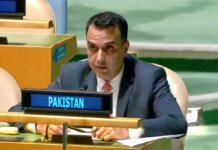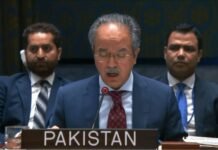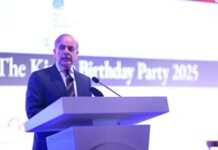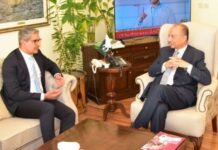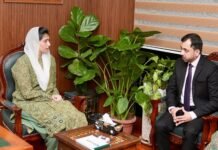Islamabad, 10 November 2021 (TDI): Shireen Mazari, Minister of Human Rights, met with an OIC team to discuss Indian human rights violations in Jammu Kashmir. Ambassador Yousef Aldobeay, the OIC’s Special Envoy for Jammu and Kashmir, is visiting Pakistan and the Azad Jammu and Kashmir.
The OIC Special Envoy on Kashmir is visiting Pakistan and AJK these days and led a delegation to discuss HR violations by the fascist Modi regime. https://t.co/5XvLgCOiOC
— Shireen Mazari (@ShireenMazari1) November 9, 2021
Earlier in September 2021, Foreign Minister Shah Mahmood addressed the press conference in Islamabad. The Federal Minister for Human Rights, Shireen Mazari, and National Security Advisor, Yusuf Moeed also accompanied him. The purpose of the conference was to expose Indian violations of human rights in Jammu and Kashmir.

The Foreign Minister presented a dossier in which the details of human rights violations in Indian Occupied Kashmir state are reported at length. The dossier is based on 131 pages and it contains three chapters.
Chapter first details the war crime and genocidal acts committed by Indian occupation forces in IOK.
Chapter second discusses the indigenous movement of resistance by the Kashmiris against illegal Indian occupation. The reason for resistance in chapter is described as the policies of Indian government which has disgruntled the Kashmiris, instead of Indian propaganda that outside interference is instigating the resistance.
Chapter Third underlines violations of Indian government in resolutions of UN Security Council passed on Kashmir; norms of international law and human rights law.
Shah Mahmood highlighted the fact that the dossier should not be considered as propaganda because the references it contains include only a little portion of Pakistani sources.
Out of 113 references, 36 references have taken from international media sources including BBC, New York Times, the guardian, and Al-Jazeera. 41 references are based on Indian sources which comprise of the Indian media and think tanks. Moreover, 32 sources of references include the reports of human rights organizations such as Amnesty International and Human Rights Watch.
Only 14 Pakistani sources are used for references out of 113.
The gross human rights violations by the Indian Government and its armed forces reported in the dossier:
- 3232 cases of war crimes committed by Indian occupation forces. Of which 1,178 cases involve Indian personnel, 7 deputy inspectors general, 5 brigadiers, 31 colonels, and 188 majors and captains.
- Indian forces run 239 torture cells
- Over 96,000 extra-judicial killings
- 162,000 arrests and torture cases
- More than 25,000 pellet gun injuries
- 11,250 women have been gang-raped by the Indian occupied forces
- 23,000 women are widowed
- More than 108,000 children are orphaned
- More than 110,000 properties are destroyed in search operations
- 8652 mass graves have been founded in 89 villages in IIOK
- The brutality of Indian occupied forces has caused serious mental distress among Kashmiris. 26% of the population is surviving through post-traumatic stress disorder (PSTD) and 41% are suffering from anxiety. 45% of the population is suffering from depression while 47% Kashmiris face traumatic experiences.
- The number of draconian laws have been imposed in occupied Kashmir to curtail the resistance movement of Kashmiris. These laws have provided the Indian occupation forces with unlimited impunity. They include:
- Jammu and Kashmir Public Safety Act
- Terrorist and Disruptive Activities (Prevention) Act
- Armed Forces (Jammu and Kashmir) Special Powers Act
- Jammu and Kashmir Disturbed Areas Act
- Prevention of terrorism act
- Unlawful Activities (Prevention) Amendment Act 2019
The Indian occupied Kashmir is called the most militarized area of the world. By applying force India wants to sabotage the resistance movement of the Kashmiris. Through its illegal occupation, India is violating international law. According to international law the Kashmiris possess the right to self-determination owing to which they are entitled to choose their political, social, cultural, and economic future freely.



